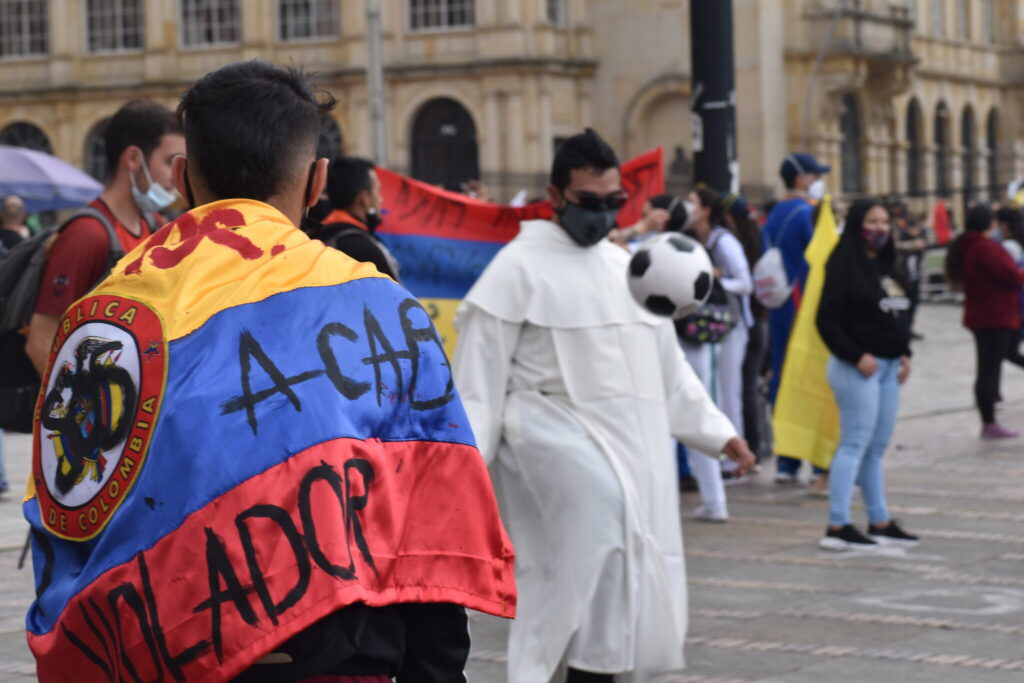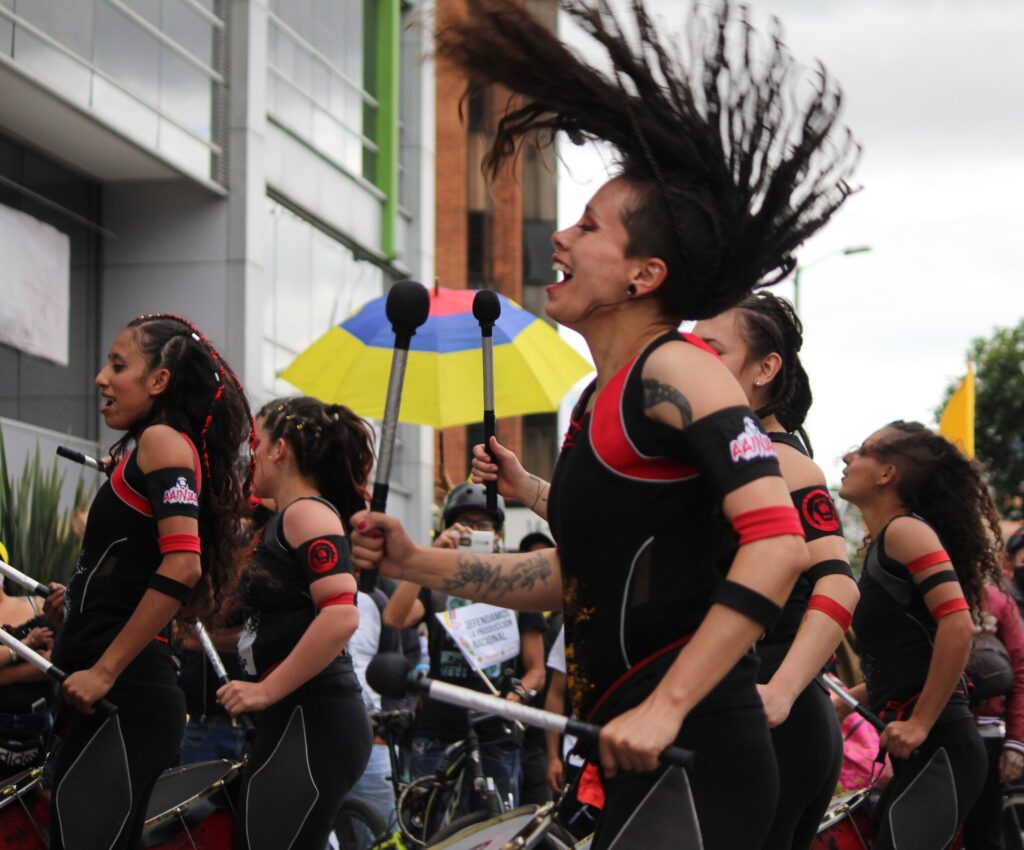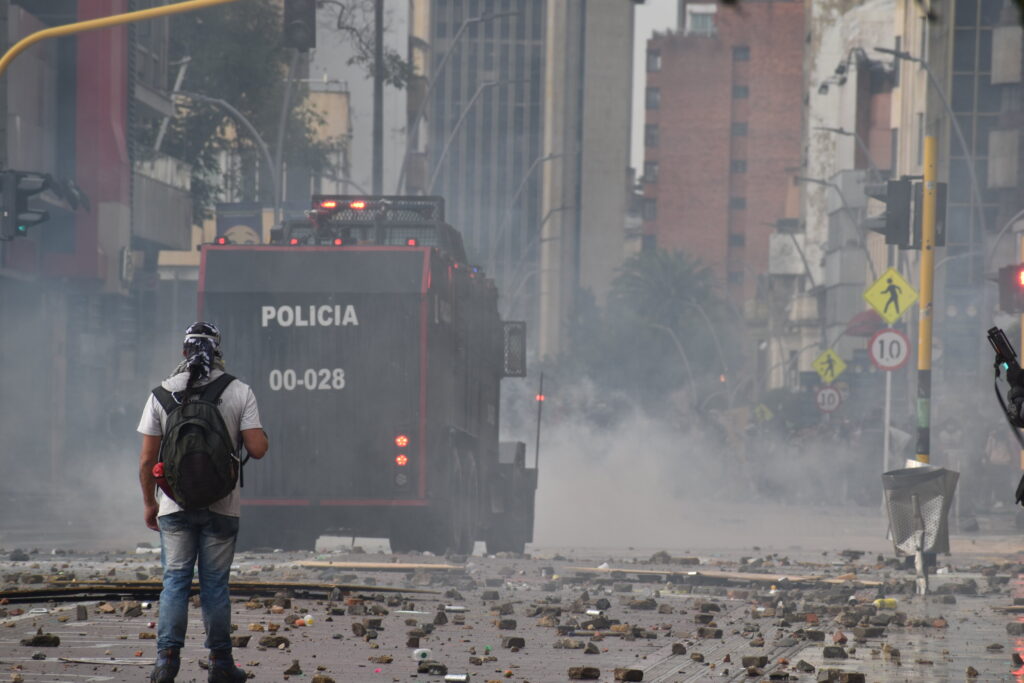El gobierno colombiano opta por la fuerza en lugar del diálogo mientras continúan las protestas
Por Joshua Collins.

Joshua Collis es un periodista independiente con sede en Colombia que ha informado para Al Jazeera, Vice y The New Humanitarian.
Bogotá, Colombia. Deisy Paricio enciende velas en una ceremonia de conmemoración en el barrio de Soledad para aquellos que han fallecido durante los diez sangrientos días de protesta en Colombia. «Estamos aquí para denunciar las acciones de un régimen criminal», dice, con una fría cadencia en su voz que roza la furia. «Estamos exigiendo justicia. Exigimos dignidad para las víctimas de este gobierno».
A su alrededor, unos cientos de manifestantes sostienen antorchas y velas en sus manos. Corean una y otra vez al unísono rítmico: «¡El pueblo, unido, jamás será dividido!».
Tras unos minutos de silencio, un orador lee los nombres de las 34 personas que han perdido la vida desde que comenzaron las protestas en todo el país el 28 de abril. Después de cada uno de ellos, los manifestantes hacen sonar las cacerolas que han traído para este fin, una táctica de protesta común en latinoamericana que se remonta a décadas atrás llamada «cacerolazo».
El ambiente en la ceremonia de conmemoración es muy diferente al de ocho días antes, cuando decenas de miles de personas salieron a la calle cantando y bailando, en una masiva y festiva marcha de protesta en el centro de la ciudad, donde fueron rápidamente gaseados por fuerzas policiales, y altercados callejeros entre jóvenes enfurecidos y la policía colombiana se extendieron por las calles laterales del laberíntico centro de Bogotá.
Día tras día, el ambiente se ha vuelto más sombrío a medida que la violencia del Estado seguía aumentando contra las protestas, en su mayoría pacíficas. La policía ha confirmado 34 fallecimientos, aunque dice que siete de ellas no están relacionadas con las protestas. Las ONG de la región afirman que las cifras reales son mayores de lo que reflejan las estadísticas oficiales. Temblores, un grupo a favor de los derechos humanos en Bogotá que ha hecho un seguimiento de la violencia, informa 37 fallecimientos y más de 300 heridos, con un total de mil 728 casos registrados de violencia policial.

«Hemos observado el aumento de la violencia con extrema preocupación», dijo Alejandro Lanz, codirector ejecutivo de Temblores. «La mayoría de las víctimas que hemos registrado han sido jóvenes que protestaban pacíficamente. No hay garantía de vida para nadie».
Las redes sociales se inundan cada noche con un torrente de vídeos gráficos e inquietantes de violencia, en su mayoría a manos de la policía, mientras los jóvenes libran batallas campales en las calles entre gases lacrimógenos y granadas aturdidoras.
Tanto Temblores como otra ONG, Indepaz, un grupo de supervisión de la paz en Colombia, han informado de que han recibido indicios de disparos indiscriminados de la policía contra civiles en medio del caos.
«Tengo que irme», dijo Lanz a Ethnic Media Services a las 9 de la noche del viernes, interrumpiendo una entrevista. «Como todas las noches, estamos a punto de empezar a recibir informes sobre la violencia que se está produciendo en todo el país. Nuestros investigadores y abogados centrarán toda su atención en ello durante las próximas horas».
Los activistas convocaron un paro nacional en Colombia hace casi un mes por el aumento de la violencia, la constante de asesinatos de líderes sociales, el aumento de la pobreza, así como la desigualdad y lo que los críticos ven como promesas fallidas por parte de la administración del presidente Iván Duque en relación con el acuerdo de paz del país de 2016 con el grupo rebelde de las Fuerzas Armadas Revolucionarias de Colombia –FARC–.
El acuerdo puso fin a una guerra civil de 50 años en Colombia, pero también fue muy controvertido. Duque ganó las elecciones en 2018 prometiendo desmantelar aspectos del acuerdo, y ha cumplido esas promesas. Las inversiones prometidas a las comunidades rurales nunca llegaron, las tácticas en la guerra contra las drogas se intensificaron y los que perdieron sus tierras en el conflicto de medio siglo –que esperaban que la paz significara que podrían regresar a sus hogares– siguen esperando.
Estos problemas se han estado hirviendo a fuego lento durante años, y culminaron en 2019 con protestas masivas que quedaron en suspenso por la llegada de la COVID-19 a Colombia. Las protestas se paralizaron bajo medidas de bloqueo extremas y una economía paralizada que elevó la tasa de pobreza al 42.7 por ciento.
Un proyecto de ley de impuestos profundamente impopular que habría aumentado el coste de los alimentos y los bienes de consumo básicos dio al movimiento de protesta un gran impulso en el apoyo popular, y fue reportado en gran medida como el tema insignia que impulsó el movimiento, pero las severas medidas policiales y la retórica de línea dura del partido de Duque pronto desplazaron a los impuestos como el principal objetivo de los que estaban en las calles. El controvertido proyecto de ley ha sido retirado, pero las protestas se han transformado en un descontento más profundo con el propio gobierno.

La respuesta del gobierno ha sido, principalmente, una retórica de línea dura contra los manifestantes. La asesora presidencial en materia de derechos humanos, Nancy Patricia Gutiérrez, declaró en una entrevista con la revista Semana que «los derechos humanos sólo existen para los ciudadanos que cumplen con sus deberes como parte de la sociedad».
Varios políticos del partido Centro Democrático de Duque han calificado a los manifestantes de «terroristas», «narcos» e incluso han afirmado que los manifestantes están organizados por grupos guerrilleros. Estas acusaciones se han hecho sin pruebas.
«El impulso, por ahora, está claramente con los manifestantes», dijo Sergio Guzmán, director de Colombia Risk Analysis, un grupo de investigación y consultoría en Bogotá. «El gobierno también es consciente de que está atrasado en la narrativa y se desespera cada vez más. La administración no ha ofrecido más que una retórica del miedo desde que comenzaron estas protestas. Pero fuera de su base, no están encontrando un público receptivo».
Mientras tanto, el gobierno ha militarizado múltiples ciudades e incluso ha discutido públicamente la declaración del estado de emergencia nacional, una medida que podría significar la suspensión del derecho de protesta.
La Organización de las Naciones Unidas, Human Rights Watch y la Embajada de Estados Unidos en Colombia han pedido que se minimice la escalada y que se respeten los derechos de los manifestantes.
De vuelta a Soledad, en la ceremonia por los que pagaron el precio más alto durante las protestas, Ana, que no quiso dar su apellido, se sentó con su novio, y la pareja se tomó de la mano mientras se leían los nombres de las últimas víctimas.
«Sólo queremos que el presidente Duque escuche lo que tenemos que decir», dijo. «Parece que todos los políticos, todos los expertos y todos los medios de comunicación quieren decirnos lo que pensamos».
«Esta violencia es tan absurda. Todo podría haberse evitado tan fácilmente si tan sólo nos escucharan».

